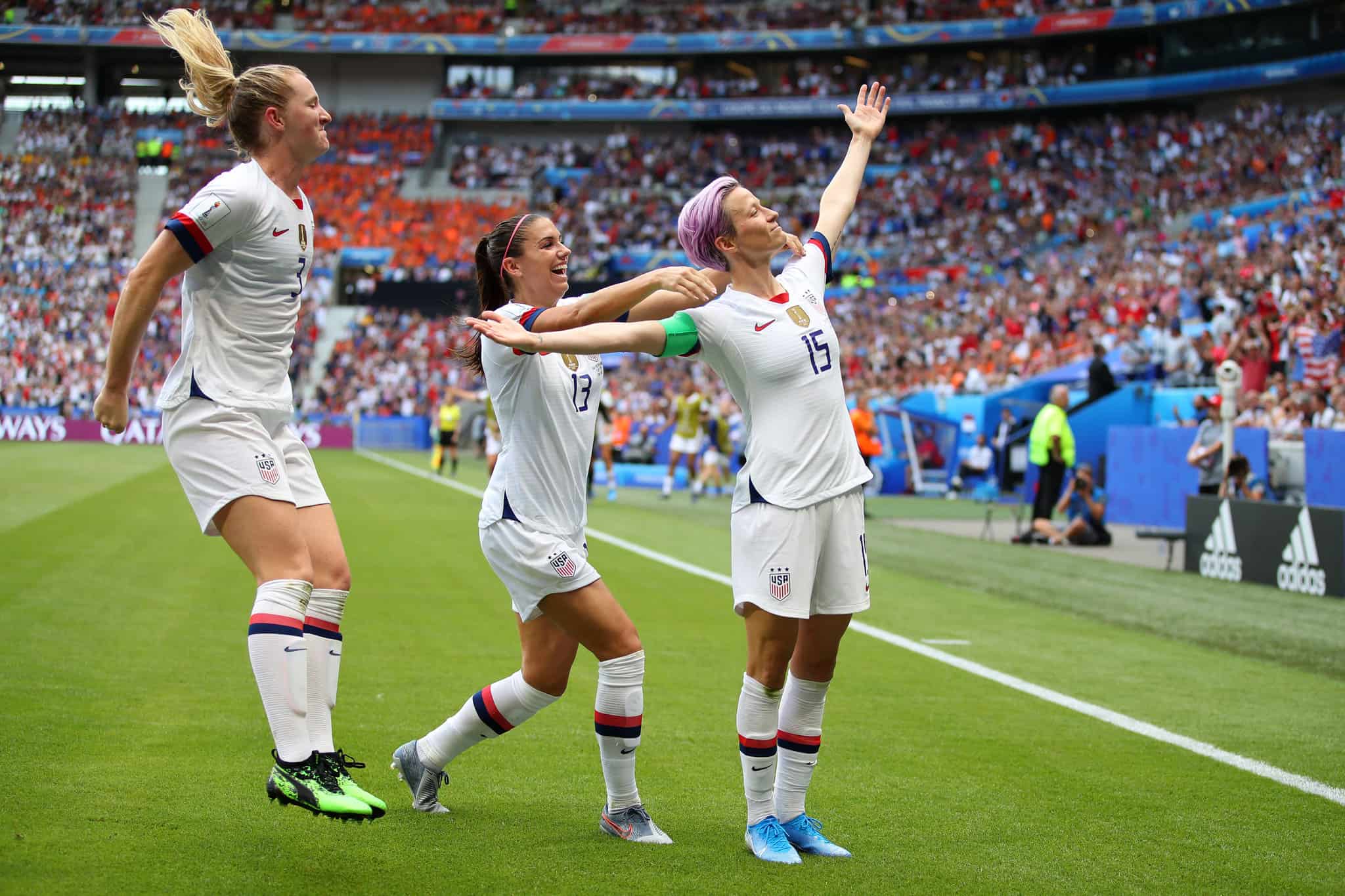
Minnie Che is a student at Harvard Law School.
Megan Rapinoe, captain of the National Women’s Soccer League’s OL Reign — who won gold for the U.S. in the 2012 London Summer Olympics, 2015 FIFA Women’s World Cup and 2019 FIFA Women’s World Cup — testified in front of the House of Representatives yesterday, which was Equal Pay Day in the US. She spoke on the pay inequality present in male and female sports, saying “One cannot simply outperform inequality or be excellent enough to escape discrimination of any kind.” Rapinoe has been an outspoken supporter of greater equity for the women’s national team and was a part of the gender-discrimination lawsuit filed against the U.S. Soccer Federation (USSF) in 2019. Although players are still appealing the decision handed down by a federal judge to dismiss the claim of unequal pay based on gender discrimination, the women’s national team was able to reach a settlement with USSF to give women the same considerations as men for game venues, travel accommodations, and staffing. Rapinoe brought to light that despite filling stadiums and breaking viewing records, the women’s soccer team is still paid less than the men’s team and without equity, “we don’t know the real potential of women’s sports.” While USSF’s president has stated a public commitment to equal pay, the federation has not taken full responsibility, stating that the World Cup prize money Rapinoe is claiming is controlled by FIFA and not within the authority of the USSF to release.
In other sports news, NCAA President Mark Emmert has written that he will be calling for an “independent review” of the processes that led to the inequalities between the men’s and women’s basketball tournaments. Last week, images and videos surfaced on social media depicting the substandard quality of the women’s weight training facilities in San Antonio compared to those of the men’s in Indianapolis. The women’s facility had a single dumbbell rack and a stack of yoga mats, while the men’s facility boasted of massive weight training equipment. The NCAA has also been accused of disparities between men and women’s “swag bags,” their food options, and even the availability of Covid-19 testing. Rapinoe addressed the NCAA and Emmert by name: “you just simply have to do better.”
H&M is facing backlash from the Chinese state media over a statement that the brand issued last year on its concerns about forced labor in China’s Xinjian region. Chinese brand ambassadors and others social media users advocate for boycotting the brand as they allege that H&M smeared China’s name. This is in reference to a statement that H&M released last year stating apprehensions they had about reports of discrimination against ethnic minorities and forced labor in Xinjiang. Onlabor has reported on alleged labor violations in the Xinjiang region in the past. Editor-in-chief of the nationalist tabloid, the Global Times, has commented about H&M’s situation, saying that western companies “should not be involved in this ideological conflict between China and the West under any circumstances.” H&M’s public criticism in China over its statement is an example of how multinational companies are struggling to address human rights issues as Western and Eastern governments differ on their values and responses.
Relatedly, two U.S. Senators are pressuring solar energy lobbying groups to clarify whether their solar products are linked to forced labor in the Xinjiang region, as the United States and other Western countries attempt to address human rights abuses by the Beijing government. Marco Rubio and Jeff Merkley asked the Solar Energy Industries Association (SEIA) to clarify procedures in place to ensure that their products sourced from Xinjiang were not produced with forced labor. The senators state that reliance on a China-based supply chain “fails to protect consumers from inadvertently contributing to human rights abuses abroad.” SEIA’s vice president of public affairs, Dan Whitten, has stated that the SEIA is calling for American solar companies to completely exit the Xinjiang region by June of this year.
After Myanmar’s military overtook the government last month in a military coup, thousands of protesters have been taking to the streets – among them female minority rights activists, labor unions, garment workers, and student groups. Even before the coup, workers’ rights and the civil rights of ethnic minorities in Myanmar was scarce. A leader of the All Burma Federation of Trade Unions, Kyaw Myo, was sentenced to six months in prison for organizing a walkout. He received another two months for protesting against police violence, and another three months for another protest on the same issue. Labor groups are now in a unique position to catalyze and maintain resistance against the military, as one female activist states that they are “the only political force with mass base.” Labor unions never stopped protesting under the prior government and have been able to organize quickly and effectively during the coup. In addition to protesting, other workers have joined in the Civil Disobedience Movement, wherein health care workers, teachers, railway workers, and diplomats have all gone on strike nationwide. Labor activists are seizing a moment of grave turmoil in the nation to kick start what hopefully will be a radical change in status quo.






Daily News & Commentary
Start your day with our roundup of the latest labor developments. See all
February 26
Workplace AI regulations proposed in Michigan; en banc D.C. Circuit hears oral argument in CFPB case; white police officers sue Philadelphia over DEI policy.
February 25
OSHA workplace inspections significantly drop in 2025; the Court denies a petition for certiorari to review a Minnesota law banning mandatory anti-union meetings at work; and the Court declines two petitions to determine whether Air Force service members should receive backpay as a result of religious challenges to the now-revoked COVID-19 vaccine mandate.
February 24
In today’s news and commentary, the NLRB uses the Obama-era Browning-Ferris standard, a fired National Park ranger sues the Department of Interior and the National Park Service, the NLRB closes out Amazon’s labor dispute on Staten Island, and OIRA signals changes to the Biden-era independent contractor rule. The NLRB ruled that Browning-Ferris Industries jointly employed […]
February 23
In today’s news and commentary, the Trump administration proposes a rule limiting employment authorization for asylum seekers and Matt Bruenig introduces a new LLM tool analyzing employer rules under Stericycle. Law360 reports that the Trump administration proposed a rule on Friday that would change the employment authorization process for asylum seekers. Under the proposed rule, […]
February 22
A petition for certiorari in Bivens v. Zep, New York nurses end their historic six-week-strike, and Professor Block argues for just cause protections in New York City.
February 20
An analysis of the Board's decisions since regaining a quorum; 5th Circuit dissent criticizes Wright Line, Thryv.